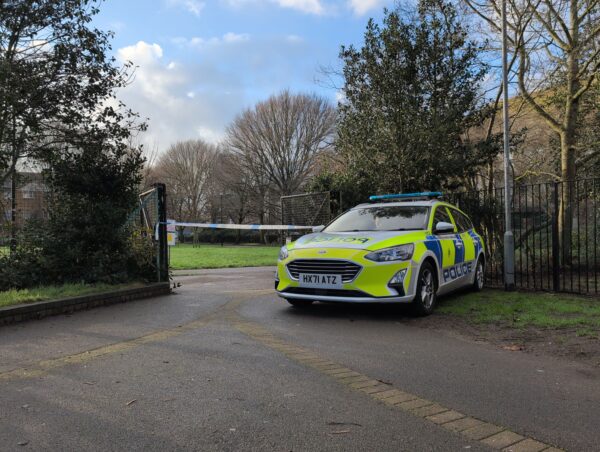
A crackdown against fly-tipping by New Forest organisations is helping to clear up after a steep rise in the amount of waste dumped there over recent years.
Regular spot checks on vehicles have helped to cut the level of fly-tips on the Forest by around 50% in the last year compared to pre-pandemic levels.
Like many other rural areas of the country, incidents of fly-tipping in the New Forest have surged in the last few years. Responding to this, a joint initiative between Forestry England, Hampshire Constabulary, New Forest District Council and the New Forest National Park Authority has been helping to tackle the issue.
In a series of joint operations this year, over 140 vehicles have been stopped and checks carried out on waste carrier licences, the items being carried, and a range of other safety requirements. Those unable to provide evidence of the appropriate licence have been required to submit this to New Forest District Council within a set deadline.
Other offences tackled during the spot checks include eight prohibition notices for insecure loads or mechanical defect, eight tickets issued or vehicles seized for a lack of MOT or insurance, and a small number of drug related offences.
Since October 2021, New Forest District Council’s environmental enforcement team has issued 107 fixed penalties for waste related offences, and several fly-tipping cases are being investigated for possible court action. The team have also seized several vehicles for waste related offences.
In a further joint operation, action was taken after an area of the Forest near Stoney Cross had become a hot-spot for illegal activity and anti-social behaviour, including the illegal dumping of polluting car wrecks. Rusting, old vehicles dumped next to the Open Forest were removed and the area made safe, with new stock-proof fencing installed in the area.
Despite the reduction, fly-tipping remains a significant issue. Over the last year, the areas of the New Forest managed by Forestry England have seen a wide range of items fly-tipped in or close its car parks. The organisation has removed over 800 tyres, around 500 bags of garden waste, truckloads of building rubble, cleared up dumped food waste, and arranged for the specialist removal of hazardous chemical waste and asbestos. Removing these items diverts Forestry England’s limited resources from being used to support wildlife and conservation projects and providing facilities for those using the Forest.
New Forest District Council continues to respond to fly-tipping reports across the district, which over the last year have included large fly-tips of household waste from renovations, business waste, abandoned vehicles, graffiti and litter such as discarded cigarettes.
New Forest Heart Police Community Support Officer Richard Williams, said: “Fly tipping is a major cause for concern in the local communities, and this is why it is treated as such a high priority by our local Neighbourhood Policing Teams. Working jointly with New Forest District Council, New Forest National Park Authority and Forestry England is vitally important for us in being able to tackle the core issues; whether that be warning and informing members of the public through educational programmes or taking robust enforcement action when required.”
“We encourage the public to take responsibility for the disposal of their rubbish by checking and verify who they are paying to take away their waste and rubbish, and ensuring they have the correct licences to do so. Otherwise, a local resident could be on the end of a knock at their door for which they would be liable, even if they hadn’t discarded the waste themselves!”
“We have really focused our attention on this issue over the last 12 months and are beginning to see a marked improvement in reducing fly tipping incidents across the Forest. We will continue to support our local partners to reduce the amount of fly tipping that is blighting the outstanding natural beauty of the New Forest.”
Charlotte Belcher, Community Manager for Forestry England said: “Fly-tipping is not only unsightly but in a location like the New Forest it can be extremely damaging. Food and garden waste can prove fatal to wildlife and the ponies that graze here, and chemical or organic waste can cause lasting damage to wildlife and the landscape. It’s really encouraging to see that the joint action being taken is having an impact and we remain committed to working with our partners in continuing to tackle this issue.”
Cllr David Russell, New Forest District Council Portfolio Holder for People and Places, said: “Our joint operations with our partners have been a crucial part of our efforts to tackle fly-tipping in the New Forest, and have allowed us to communicate the importance of this issue directly to residents and businesses operating in the district.
“Discarding any waste or litter can cause harm to animals and their habitats, and people. This can have devastating long-term consequences and we need to do everything we can to prevent it. To reduce our impact on climate change and to protect our local environment, we must have a no tolerance approach to fly-tipping. Anyone caught fly-tipping will be issued a fine, and we urge residents to contact us in confidence if they witness any incidents or suspicious activities.
“As a council, we are investing in technology, including cameras to try to detect more fly-tipping crimes, which often take place in isolated areas. Our environmental enforcement team also carry out duty of care visits to businesses to offer guidance and ensure that waste is being disposed of correctly.”
Steve Avery, Executive Director of the New Forest National Park Authority said: “More than half of the New Forest National Park is designated of international value for nature conservation and as a Site of Special Scientific Interest (SSSI) – areas which are protected because of their rare habitats and wildlife. This is a higher proportion than any other authority area in the country.
“Fly-tipping can harm the grazing animals which are so vital in shaping the landscape and maintaining rare Forest habitats. It can also block entrances and tracks, preventing daily operations in this living, working Forest.
“We all have a role to play in caring for the local environment and working together across organisations is vital to ensure the future of the Forest. Our joint actions are already helping to curb various damaging or anti-social behaviour and we’ll continue to help tackle these issues head-on.”
The organisations plan to continue carrying out spot checks throughout the year at locations across the New Forest and are working together on a range of other measures to deter and reduce waste being dumped in this way.
They are also asking all householders and businesses disposing of waste to ensure their waste providers are licenced. This can be easily checked online via https://environment.data.gov.uk/public-register/view/search-waste-carriers-brokers




